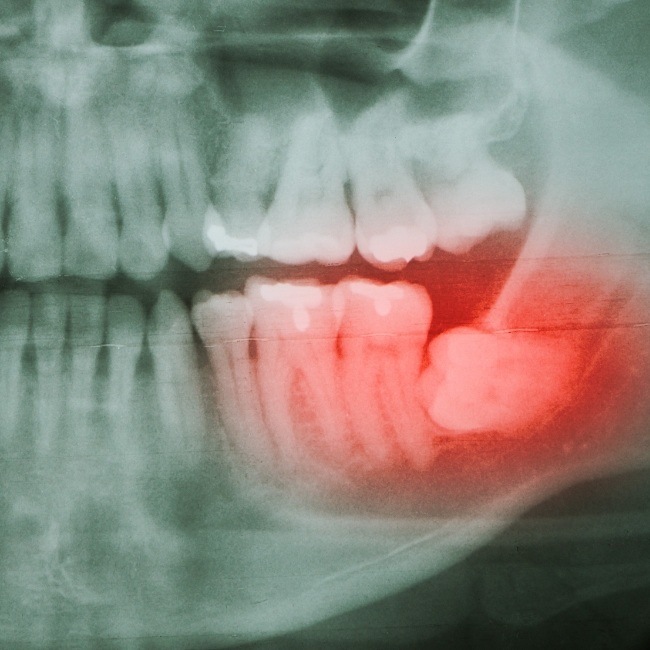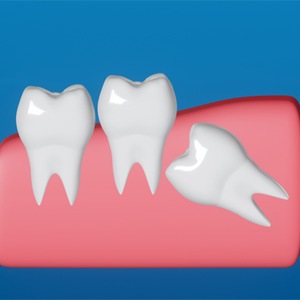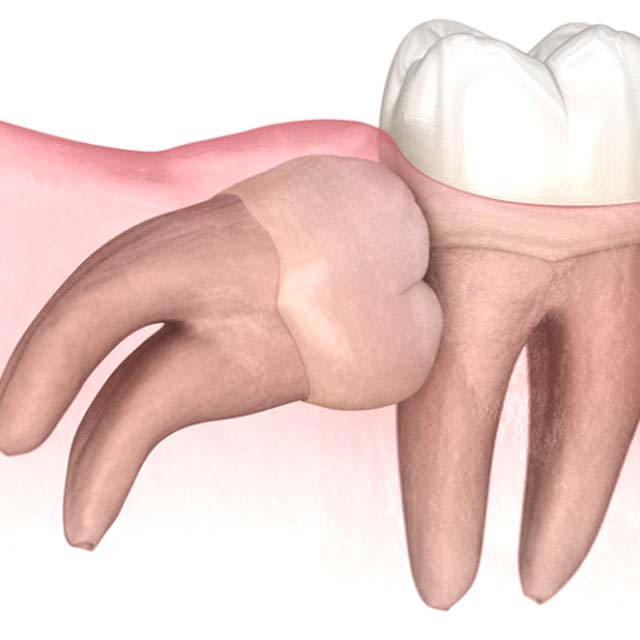Wisdom Tooth Removal – Katy, TX
Gentle & Comfortable Wisdom Tooth Care
For most people, a rite of passage into adulthood is having their wisdom teeth removed, as this set of molars typically doesn’t start to come in (and become stuck) until the ages of 16-21. Dr. Koo and Dr. Shepard have performed wisdom tooth extractions literally thousands of times apiece for both teens and adults, so if you or your child requires wisdom tooth removal in Katy, TX, you can trust that your/their comfort and health will be assured throughout the entire process.
Third Molars: Explained
Back in caveman times, the wisdom teeth were extremely useful, as they allowed our ancestors to chew the uncooked roots, vegetables, and dried meats that made up most of the rough early human diet. Scientists believe that they were intended to replace the first and even second molars after they inevitably became damaged and worn down. But, with advancements in cooking techniques and dental care over the ensuing millennia, people started keeping all of their teeth well into early adulthood and beyond, so now, when the wisdom teeth appear, there simply isn’t enough room for them in the mouth.
Reasons for Wisdom Tooth Extractions

Your dentist or oral surgeon may recommend that the wisdom teeth be removed if:
- They are unable to come in properly because they are stuck within the gums/jaw
- They are placing pressure on the back teeth and moving them
- They are pressing on a nerve and causing pain/numbness
- Their location/orientation makes them difficult to clean, causing someone to be very vulnerable to cavities
Before Your Tooth Extractions: Pre-Operatory Tips

To ensure a smooth and comfortable experience, here are a few simple steps you can take ahead of your wisdom tooth extraction:
- Brush and floss your teeth right before coming to see us.
- Because you will be sedated, make sure you organize for someone to drive you to and from our oral surgery office.
- Organize for childcare on the day of and after your procedure if necessary, as it is important that you rest and be relatively inactive to start the healing process.
- Do not eat or drink anything 6 hours before the procedure.
- Stock up on soft foods to eat while you recover so you don’t have to go to the store after surgery.
After Your Tooth Extractions: Post-Operatory Tips

Recovering from a wisdom tooth extraction is relatively easy and straightforward. All you have to do is follow your doctor’s instructions, which will involve measures such as:
- Take it easy the day of your procedure and do not engage in any physical activity, which will give the surgery sites the best chance to clot.
- Do not smoke, drink from a straw, or rinse your mouth within the first 24 hours.
- Take any medication as prescribed for pain and apply an icepack to the face in 10-minute increments to reduce swelling.
- Avoid brushing near the surgery site for a few days—you can rinse your mouth gently with saltwater after the first 24-hours to help keep the treatment areas clean.
- If pain or swelling persists for a week or more, or if you develop a fever, contact us immediately, as you may be dealing with an infection.
Understanding the Cost of Wisdom Tooth Extractions

The cost of wisdom tooth extractions varies from patient to patient. It depends on a few different factors. During your consultation, we will be able to talk about specific numbers. We will also help you understand your payment options. For example, we can assist you with your insurance claims and help you apply for financing. With the available provisions, most patients are able to afford their wisdom tooth extractions without too much trouble.
Factors That Can Impact the Cost of Wisdom Tooth Extractions

Some factors that can have a bearing on the cost of wisdom tooth extractions include:
- How many teeth need to be removed. Some people have four wisdom teeth; others have fewer (or even more). A number of patients may have all four wisdom teeth but choose not to get all of them extracted. Logically, more extractions lead to higher fees.
- Whether or not the wisdom teeth are impacted. Impacted teeth are more challenging to remove than teeth that have fully erupted, so extracting them may cost more. The type of impaction that is present can also affect the total price of care; some wisdom teeth are stuck in the jawbone, whereas others are impacted in the soft tissue.
- The type and amount of sedation used. Some patients just need local anesthesia during wisdom tooth extractions. Others, though, require more powerful forms of sedation, which can cost hundreds of dollars or more.
- Who performs the surgery. Our fees are competitive with other oral surgeons in the area. General dentists and other specialists may have different pricing structures.
Does Dental Insurance Cover Wisdom Tooth Extractions?

Many dental insurance plans do cover at least part of the cost of wisdom teeth removal. However, you may still have to pay 50% (or more) of the total bill. It is also worth checking with your health insurance to see if they cover oral surgery; they may provide coverage if the extractions are considered to be medically necessary.
Our team can help you to verify your benefits and use them in the most advantageous way possible.
Other Options for Making Wisdom Tooth Extractions Affordable

If you do not have insurance, or you will still have a significant bill even with insurance coverage, ask us about financing. Most patients are eligible for a low-interest payment plan through CareCredit. The application process is fast, and most patients are approved for an installment arrangement that fits within their budget.
Wisdom Tooth Extractions FAQs

The experts at Piney Point Oral & Maxillofacial Surgery are ready to help you find freedom from all of the complications that wisdom teeth can bring. Still, before you schedule your consultation, you may want to learn more about what to expect from your surgery. To prepare you for the road ahead, we have compiled a list of frequently asked questions about wisdom tooth extractions in Katy. If you do not see the information you were hoping for, please give us a call so we can personally assist you.
Does Everyone Have Wisdom Teeth?
Most people develop four wisdom teeth. However, there are exceptions. One article from the Dental Research Journal, published in 2015, estimates that 5 – 37% of people are missing one or more wisdom teeth. No one really knows why some individuals never get their third molars, but it is possible that genetics play a role. If one of your parents does not have wisdom teeth, you are more likely to be missing one or more of them.
Keep in mind as well that even if you cannot see your wisdom teeth, you may have them. They often stay beneath the gumline if there is not enough space for them to erupt into your mouth. An X-Ray can reveal how many you have and whether they may eventually pose a threat to your oral health.
How Should I Prepare for My Wisdom Tooth Extraction?
After your dentist in Katy refers you to us for your wisdom tooth removal surgery, there are a few things you can do to prepare for your procedure. For example, we encourage you to make a list of any questions you have, and bring it to your appointment with us. We want all of our patients to be well-informed about any service we perform for them.
Here are some additional, practical measures you can take:
- Arrange for a friend or family member to drive you to and from your surgery appointment.
- Be honest and open about any medications or recreational drugs that you use, as well as how much alcohol you drink. These can be important factors when our team is preparing to sedate you.
- Do not smoke for the at least the last 12 hours before your procedure.
- If you will be put under general anesthesia, do not eat after midnight the night before your surgery.
- Wear comfortable clothing. It may be helpful if you have short sleeves or sleeves that are easy to roll up.
- Purchase some soft foods that are simple to prepare so you will have plenty to eat after you go home.
Is Wisdom Tooth Removal Painful?
We will make sure your mouth is numb during your procedure. We also offer multiple types of sedation, which will limit your body’s ability to feel pain. Most patients feel little to nothing during their surgery.
After the sedation and anesthesia wear off, some soreness is to be expected. Eating soft foods, taking pain relievers as necessary, and getting plenty of rest can help to facilitate a smooth recovery.
What’s the Best Age to Get Wisdom Teeth Removed?
The best time to get wisdom teeth removed is generally when someone is in their late teens or early 20s. During this age range, the wisdom teeth may not be completely developed, a fact that can make them simpler to remove. Younger people also tend to bounce back quite quickly from surgery.
Of course, there is no upper age limit for this procedure. We can perform wisdom teeth removal for individuals in their 30s, 40s, and beyond.
Why Do We Have Wisdom Teeth?
For modern humans, wisdom teeth might seem like they are little more than a nuisance. For past generations, though, they were vital for survival!
Scientists agree that ancient human ancestors developed wisdom teeth in order to help them consume a rough diet that included things like berries, nuts, roots, and raw meats. By the time they reached their late adolescence, their teeth were starting to wear down. A third set of molars could help them chew food and make the difference between life and death.
Even though wisdom teeth are not necessary for modern humans, they are still coded into the DNA of most people.
How Do You Make Wisdom Teeth Pain Go Away?
The only permanent way to get rid of wisdom teeth pain is to have them extracted. Before your surgery, though, there are steps you can take to reduce your discomfort:
- Apply a cold compress to the side of your face for 20 minutes at a time. Do this every few hours to reduce swelling and numb the area.
- Take over-the-counter pain medications to reduce pain and inflammation. If you take aspirin, do not apply directly to your wisdom teeth or the surrounding tissues.
- Use an over-the-counter oral analgesic to numb the area.
- Regularly rinse your mouth with warm salt water.
- Do not eat hard or crunchy foods that might irritate your painful teeth.
What Is the Best Age to Get Wisdom Teeth Removed?
Many people get their wisdom teeth removed when they are in their late teens or early 20s. We often recommend the surgery around this age because if you wait, the roots of your wisdom teeth will grow and become more firmly embedded in your jaw. This can make the removal surgery more challenging and lead to a longer recovery time.
Of course, that is not to say that you cannot get your wisdom teeth removed as a mature adult. We often perform this procedure for people in their 30s, 40s, and beyond.
Should Wisdom Teeth Be Removed If They Do Not Hurt?
Even if your wisdom teeth are not causing any obvious symptoms at the moment, it may be best to get them removed. An X-ray or other imaging scans might reveal that you have the beginnings of an infection or other problems. Extracting the teeth can stop such issues from becoming severe.
Some people also choose to get their wisdom teeth removed as a purely preventive measure. If you are interested in doing so, it is important that you consider both the pros and cons of moving forward with the treatment.
How Soon Can I Eat After Wisdom Teeth Removal?
Following your surgery, you may need to wait an hour or two to eat. This allows time for any bleeding to slow down. It may also give any local anesthesia time to wear off; if you try to eat while your mouth is numb, you might accidentally bite your tongue or eat something that is too hot!
When you do eat, you may need to stick to a liquid diet for a day or two. When you feel up to it, you can incorporate soft foods and then gradually resume your usual eating habits. Most people are able to eat normally within a week or two of their procedure.

